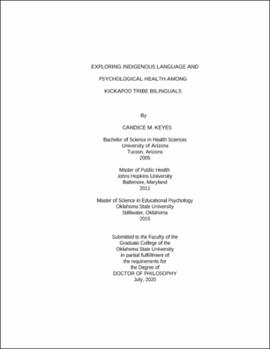| dc.contributor.advisor | Romans, John S. C. | |
| dc.contributor.author | Keyes, Candice M. | |
| dc.date.accessioned | 2023-04-20T18:24:50Z | |
| dc.date.available | 2023-04-20T18:24:50Z | |
| dc.date.issued | 2020-07 | |
| dc.identifier.uri | https://hdl.handle.net/11244/337449 | |
| dc.description.abstract | Studies show thinking and speaking in a foreign language provides a greater emotional and cognitive distance than the speaker’s native language (Keysar et al., 2012). The prospect of such a detachment of cognition is of importance especially for bilingual Indigenous populations when receiving psychological services. There is a gap in knowledge of Indigenous language use and its role in psychological health and healing. This study provided space for Kickapoo Tribe of Oklahoma bilinguals to discuss their Indigenous language as it is relates to psychological healing and to provide insight in order to better tailored services that will support alleviating behavioral health epidemics occurring in Indigenous communities. This study was built upon the Indigenous Methodology framework which is research by and for Indigenous people using their traditional knowledge (Evans et al., 2009). Participant selection utilized purposeful sampling and was comprised of eight Kickapoo Tribal member adults who spoke their Kickapoo language and the English language. Each participant completed a one to two-hour interview. | |
| dc.description.abstract | The results stemmed from analysis in which coders independently reviewed the interview transcripts using a micro analytic perspective and grounded theory methodology in order to identify concepts that represent participant responses. An “open coding” process then occurred in which themes and coding conventions were established (Strauss & Corbin, 1998). Identification of concepts and their properties were discussed to realistically represent the participants’ responses. The research team agreed upon nine themes to honor the wisdom of the Kickapoo Tribal member participants. Themes included topics such as language fluency, translations concerns, culture, historical trauma, acculturative stress, Nature, and hope. This study offers perspectives about the experience of being a bilingual Indigenous person seeking psychological healing. The participants provide the field with a deeper understanding of the perceptions held by Kickapoo Tribal member bilinguals regarding knowledge of their tribal language and psychological wellness | |
| dc.format | application/pdf | |
| dc.language | en_US | |
| dc.rights | Copyright is held by the author who has granted the Oklahoma State University Library the non-exclusive right to share this material in its institutional repository. Contact Digital Library Services at lib-dls@okstate.edu or 405-744-9161 for the permission policy on the use, reproduction or distribution of this material. | |
| dc.title | Exploring indigenous language and psychological health among Kickapoo Tribe bilinguals | |
| dc.contributor.committeeMember | Berry, Thomas R. | |
| dc.contributor.committeeMember | Hammer, Tonya R. | |
| dc.contributor.committeeMember | Wilcox, Melanie M. | |
| dc.contributor.committeeMember | Blum, Denise | |
| dc.contributor.committeeMember | Robbins, Rockey | |
| osu.filename | Keyes_okstate_0664D_16801.pdf | |
| osu.accesstype | Open Access | |
| dc.type.genre | Dissertation | |
| dc.type.material | Text | |
| dc.subject.keywords | bilingual | |
| dc.subject.keywords | indigenous language | |
| dc.subject.keywords | Kickapoo Tribe | |
| dc.subject.keywords | psychological health | |
| thesis.degree.discipline | Counseling Psychology | |
| thesis.degree.grantor | Oklahoma State University | |
